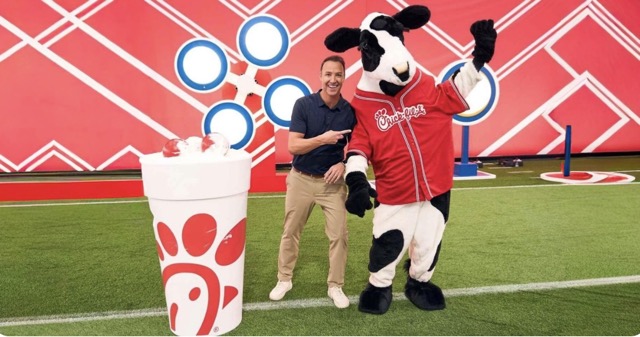Chick-fil-A has long built its reputation around more than chicken sandwiches. Known for its customer service, community involvement, and family-friendly ethos, the brand has become synonymous with a certain type of hospitality. Now, Chick-fil-A is extending that reputation beyond the walls of its restaurants. The company has launched Play it Forward, a five-episode unscripted family game show that blends fun, sports, and philanthropy. Available on the free Chick-fil-A Play App and on YouTube, the show represents a bold expansion into original digital programming.
For a restaurant chain, stepping into the entertainment business may seem unexpected. But in an era where brands are transforming into cultural producers—think Nike making documentaries or Red Bull funding extreme sports—this move feels both timely and strategic. Play it Forward is not just about games; it’s about building narratives around families, heroes, and the act of giving back.
The Concept: Games With Heart
At its core, Play it Forward is a family game show that mixes the thrill of physical challenges with the emotional pull of storytelling. Each episode is about 30 minutes long and focuses on one family tackling a set of inventive, high-energy competitions. The challenges have whimsical names—Splashketball, Cherry Launch, and others—that mirror the funhouse style of classic family television.
But here’s the twist: at the end of the episode, the family does not keep their cash prize. Instead, they use it to surprise and honor a local hero who has made a difference in their lives. The heroes can be teachers, mentors, veterans, delivery drivers, or community leaders. By combining high-spirited play with meaningful recognition, Chick-fil-A has created a format that balances fun with substance.
This choice sets the show apart from typical game shows where contestants chase personal winnings. Here, the true winners are the unsung heroes whose quiet impact finally takes center stage.
Family Stories and Local Heroes
The emotional weight of Play it Forward lies in the stories it elevates. For example, the Omagbemi family from Houston competed to honor Randall, a veteran who rallied community support during their daughter’s heart surgery. For them, the show was not just about winning a game—it was about giving thanks in a way that matched the magnitude of his generosity.
Another episode features the Prunier family from Massachusetts, who credited Susan, a local delivery driver, with saving their child’s life. Their gift of gratitude was not a symbolic gesture, but a material acknowledgment of how everyday workers can play life-changing roles.
These stories highlight an important cultural truth: heroism often hides in plain sight. While entertainment usually centers on celebrity or spectacle, Play it Forward shines its spotlight on ordinary people making extraordinary differences. This aligns perfectly with Chick-fil-A’s brand identity—rooted in local communities and personal care.
Why Chick-fil-A Made the Leap
The decision to create Play it Forward was strategic, but also deeply aligned with Chick-fil-A’s mission. Dustin Britt, the company’s executive director of brand strategy, emphasized that the series reflects the company’s effort to serve families beyond its restaurants. “We know there’s a growing need for high-quality, family-friendly content that parents and kids can enjoy together,” Britt explained.
This reflects a broader cultural shift: as streaming platforms grow more fragmented and parental concerns about content rise, there is increasing demand for entertainment that feels safe, meaningful, and communal. By stepping into this space, Chick-fil-A positions itself not just as a restaurant, but as a content creator committed to family values.
It is worth noting that Chick-fil-A already has strong family-friendly credentials. Its restaurants are known for kids’ meals, play spaces, and even board-game nights in some communities. The leap into digital entertainment feels like a natural extension of these values.
The Production and Digital Strategy
Play it Forward was produced in collaboration with Glassman Media and Sugar23, two production companies with experience in creating unscripted content. This ensures professional polish while maintaining the lighthearted, family-friendly tone.
The show is also part of the Chick-fil-A Play App, a digital platform that offers free entertainment including shows, games, music, and interactive experiences. With Play it Forward, the app gains a flagship program that signals Chick-fil-A’s ambition to be more than a food app—it is positioning itself as a family entertainment hub.
The decision to release the series on YouTube as well expands its reach. While the app provides brand-controlled space, YouTube ensures viral potential and discoverability. This two-pronged strategy demonstrates an understanding of where families actually consume content: everywhere.
Chick-fil-A in the Age of Branded Storytelling
Brands have increasingly blurred the line between advertising and entertainment. Red Bull funds daredevil stunts, Lego produces hit movies, and Nike creates short films. Chick-fil-A’s move is part of this broader evolution of “branded storytelling.”
Unlike a commercial, Play it Forward is not designed to directly sell chicken sandwiches. Instead, it reinforces emotional associations: generosity, family, and community. The goodwill generated by these stories may not translate immediately into higher sales, but it strengthens brand loyalty. Consumers are more likely to support a brand that supports their values.
The Role of Sports and Play
The show’s challenges—like Splashketball—tap into the physicality of sports while keeping the tone playful. This is important: sports are one of the few cultural spaces that naturally bring families together. By designing competitions that children and parents can enjoy watching together, Chick-fil-A creates shared experiences.
This mirrors the brand’s in-restaurant ethos, where play spaces and family meals are central. The use of humor, bright colors, and mascot appearances keeps the show lighthearted, ensuring that even in moments of tension, the atmosphere remains celebratory.
Community Flow and Emotional Resonance
Perhaps the most important impact of Play it Forward is its community resonance. By giving families the chance to honor everyday heroes, the show amplifies values of gratitude and recognition. In a culture often obsessed with individual achievement, this emphasis on collective appreciation feels refreshing.
Moreover, it encourages viewers to reflect on their own local heroes—teachers, coaches, neighbors, or first responders. The show becomes not just entertainment but a catalyst for real-world conversations about gratitude and generosity.
Comparing With Other Branded Content
It is instructive to compare Play it Forward with other branded entertainment projects. While Lego and Red Bull focus on fantasy or adrenaline, Chick-fil-A is rooted in everyday life. This makes its content more approachable, less aspirational and more relational.
In fact, it could be argued that Play it Forward follows the legacy of family game shows like Double Dare or Wipeout, but with an altruistic twist. By fusing nostalgia with novelty, it appeals to both parents and children.
The Future of Chick-fil-A Entertainment
The launch of Play it Forward raises a larger question: will Chick-fil-A continue to invest in original programming? If successful, the show could pave the way for more family-focused content—perhaps cooking shows, animated shorts, or educational series. The Play app could evolve into a genuine family entertainment hub, carving out space in a crowded digital market.
Given that Chick-fil-A already has strong brand recognition and trust, this expansion feels promising. The challenge will be to sustain quality storytelling and to ensure that entertainment remains authentic to the brand’s values.
Critical Perspective: Risks and Challenges
Of course, there are risks. Branded entertainment can sometimes feel overly promotional, leading audiences to dismiss it as advertising in disguise. Chick-fil-A must ensure that Play it Forward is perceived as genuine storytelling rather than a marketing gimmick.
Another challenge lies in content saturation. Families already have countless options for entertainment across streaming platforms. To stand out, Play it Forward must offer not only wholesome values but also engaging production. The balance of sincerity and spectacle is delicate.
Impression
Play it Forward signals a new chapter for Chick-fil-A. More than just a game show, it is a vehicle for reinforcing values of gratitude, family, and community. By shining a spotlight on local heroes, the show turns entertainment into an act of recognition and generosity.
For Chick-fil-A, the move into original programming is both a branding strategy and a cultural gesture. It aligns with the company’s identity while opening new pathways for engagement. In a media landscape often dominated by cynicism, Play it Forward offers something rare: fun rooted in kindness.
If the show succeeds, Chick-fil-A may well become not just a fast-food chain but a cultural content creator, feeding not only families’ stomachs but also their stories.
No comments yet.









